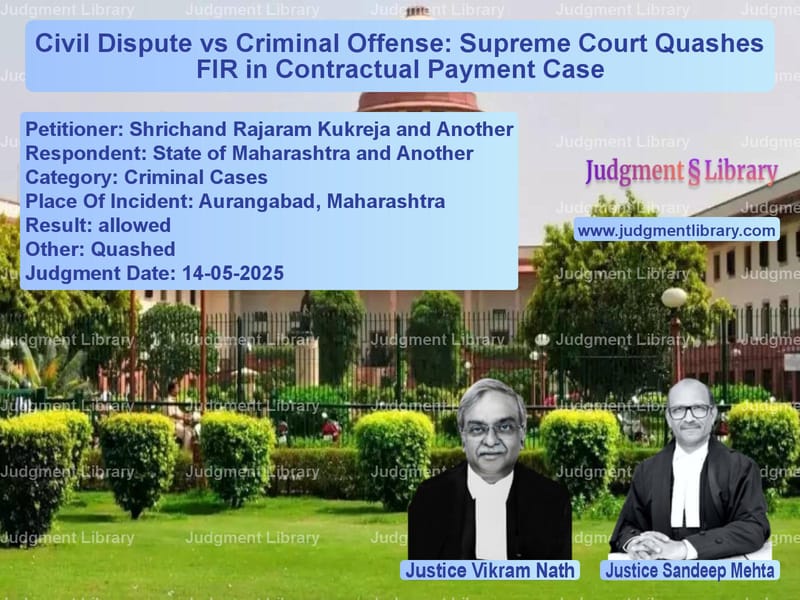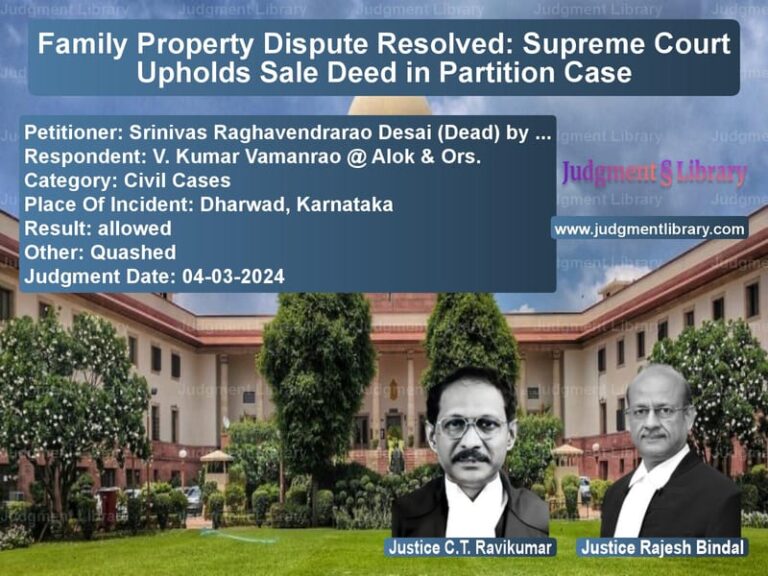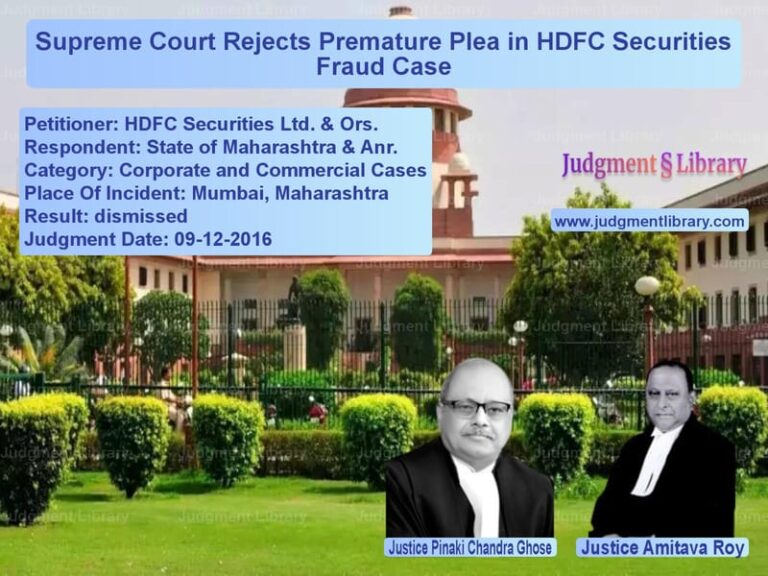Civil Dispute vs Criminal Offense: Supreme Court Quashes FIR in Contractual Payment Case
In a significant ruling that reinforces the boundary between civil disputes and criminal offenses, the Supreme Court of India delivered a crucial judgment on May 14, 2025, quashing criminal proceedings against business directors accused of cheating and forgery in a contractual dispute. The case involved Shrichand Rajaram Kukreja and another appellant versus the State of Maharashtra, centering around whether a commercial disagreement over payments between contractors could be transformed into a criminal case.
The dispute originated from FIR No. 443 of 2015 registered with MIDC Walunj Police Station, Aurangabad, where the appellants were accused of offenses under Sections 406, 420, 467, 468, 471 and 34 of the Indian Penal Code. The complaint was filed by Ashok Karbhari Shingare Patil, a professional contractor who claimed he was cheated of approximately Rs. 5.11 crore for construction work performed as a sub-contractor.
The background of the case reveals a complex web of contractual relationships. The Maharashtra Industrial Development Corporation (MIDC) had issued a tender for construction of a sewerage water filter plant on built-operate-transfer basis. Bharat Udyog Limited (BUL), represented by the appellants, emerged as the successful bidder and was awarded the project for 20 years commencing from November 25, 2021. BUL then assigned a sub-contract to S.W.D. Infrastructure Pvt. Ltd., which further sub-contracted the work to the complainant’s company, Sai Group.
The complainant alleged that after his work under the initial sub-contract ended, the appellants persuaded him to continue with the project work by offering a direct sub-contract. According to his complaint, the appellants assured him that they would receive payments from MIDC and then directly transfer the amounts to his company. Relying on these assurances, the complainant resumed work and even spent additional amounts from his own resources. However, despite submitting bills worth crores of rupees, the appellants allegedly kept giving false assurances and failed to make the requisite payments, forcing the complainant to sell his assets to meet material and labor costs.
The complainant further alleged that the appellants submitted false documents to MIDC showing two engineers employed by his company as BUL employees, and also submitted a false stock statement to Oriental Bank of Commerce, falsely claiming ownership of stocks that actually belonged to the complainant.
The Legal Battle Begins
Faced with these allegations, the appellants approached the Bombay High Court seeking quashing of the FIR under Section 482 of the Criminal Procedure Code. Meanwhile, another accused, Jaywant Mallya, filed a criminal writ petition seeking direction for fair investigation by an independent agency. In a common order dated October 8, 2018, the High Court dismissed both petitions, leading to the present appeals before the Supreme Court.
Arguments Before the Supreme Court
Senior counsel Shri K. Parameshwar, representing the appellants, made compelling arguments before the Supreme Court. He contended that “the entire case as set out in the impugned-FIR does not disclose the necessary ingredients of any offence whatsoever.” He emphasized that “a dispute which is purely civil in nature has been given the colour of a crime by misusing criminal law and the appellants herein are being harassed and persecuted in this matter.”
The counsel pointed out that the bills raised by the appellants under the contract were not honored by MIDC, leading to arbitration proceedings where awards were passed in the appellants’ favor. He also noted that the company’s accounts with Oriental Bank of Commerce had been settled with no outstanding dues. Most importantly, he argued that “even if the allegations of the complainant are to be accepted as true on their face value, it is manifest that part payment has been made to him for execution of the project work as a sub-contractor of the appellants.” This admission of partial payment, according to the counsel, clearly indicated a commercial dispute rather than criminal cheating.
Regarding the chargesheet filed during the pendency of appeals, Shri Parameshwar submitted that “the conclusions drawn in the chargesheet are absolutely vague and unsubstantiated and the Investigating Officer has just toed the line of the complainant without making any effort to seek proper legal opinion on the aspect of whether the dispute is of civil nature or not.”
On these grounds, he urged that “ex-facie, the invocation of criminal machinery for a dispute purely of civil nature is nothing short of a gross abuse of the process of law and hence, the impugned-FIR and all the proceedings sought to be taken there under including the chargesheet deserve to be quashed.”
The Complainant’s Perspective
The counsel for the complainant presented a different narrative. He argued that after the initial period of work under the sub-contract with SWD Infra ended, “the appellants induced the complainant to continue with the project work by assigning a direct sub-contract to the complainant’s company.” According to the agreed terms, “the appellants were to receive payments from the MIDC and thereafter they were obligated to honour the bills submitted by the complainant towards execution of the project work.”
However, the counsel alleged that “the appellants acted fraudulently and dishonestly thereby inducing the complainant to spend huge sums of money towards the completion of the project in question.” The appellants then allegedly encashed bills directly from MIDC without passing on the payments to the complainant. Additionally, they intentionally misrepresented to authorities that two engineers employed by the complainant’s company were their employees, thus fabricating records.
The High Court’s Problematic Reasoning
The Supreme Court carefully examined the High Court’s order and found several concerning aspects. The High Court had rejected the quashing petition based on hypothetical presumptions about the appellants’ business practices. The High Court speculated that the appellants had employed a “peculiar modus operandi whereby they obtained work orders from various Government institutions and authorities and took advance amounts in the name of investment for the institution and by using the record of the project, they raised huge loans from the banks and financial institutions.”
The High Court further presumed that “they appointed sub-contractors, but did not pass on the money received by them towards the project to the sub-contractors and most of the work was not completed and the contracts were terminated.” Based on these assumptions, the High Court concluded that there was a clear possibility that without informing or without taking permission from local authorities, “the properties of the local body may have been mortgaged for raising loan.”
The High Court also noted that “the quotient of MIDC to the tune of Rs.3,00,00,000/- was collected by the appellants and a loan of more than Rs.11,00,00,000/- was raised on the project but the amount was not passed on to the Sub-Contractor.” It observed that the appellants did not make any investment in the project and money was usurped by the stated modus operandi since the subject tender did not provide permission to assign sub-contracts. The High Court concluded that “the appellants deceived not only the sub-contractor, but also the MIDC, being the Government corporation” and recommended that the State Government consider handing over investigation to a specialized agency like the Economic Wing or CBI.
Supreme Court’s Critical Analysis
The Supreme Court, comprising Justices Vikram Nath and Sandeep Mehta, delivered a scathing critique of the High Court’s approach. The Court noted that “the conclusions of the High Court are prima facie based on sheer conjectures regarding the appellants having misused the acquired work orders for taking loan from various financial institutions as well as taking advances from the MIDC.”
The Court examined the report under Section 173(2) of CrPC filed by the investigating agency and found that “there is no reference to the accused appellants having misused the contracts/tenders awarded to them for procuring undue gain from any other financial institutions, viz., banks, etc. or from the MIDC itself.” The investigation continued for almost ten years but “not a shred of evidence has been collected by the Investigating Officer to support or fortify the conclusion of the High Court regarding financial bungling by the appellants other than the disputed transaction with the complainant.”
The Court therefore held that “the order passed by the High Court directing extensive investigation regarding the perceived financial misadventures of the appellants is ex facie erroneous and illegal and hence, the same cannot be sustained.”
Core Legal Principles Applied
The Supreme Court then addressed the fundamental question of whether the allegations in the FIR disclosed any criminal offense. The Court found that “the allegations levelled therein, even if taken to be true on their face value, do not disclose the necessary ingredients of any offence, what to say of a cognizable offence/s.” The Court emphasized that “the allegations, on the face of it, disclose a dispute which is purely civil in nature.”
The Court noted the crucial admission by the complainant that “he had received a part payment to the tune of Rs. 3,68,15,612/- from the appellants, towards the work which was carried out.” This admission clearly indicated that “the complainant’s claim is for reimbursement of the remaining amount claimed by him towards the works executed in furtherance of a contract.”
The Court strongly criticized the attempt to convert a civil dispute into a criminal case, stating that “the allegations, made in the complaint, present a dispute which is purely commercial and civil in nature. It seems that the complainant has contrived to somehow or the other, involve the police machinery to act as recovery agents on his behalf.” The Court unequivocally declared that “the complaint, on the face of record, did not disclose any offence whatsoever and no FIR should have been registered based thereupon.”
The Court referenced its consistent jurisprudence on this issue, particularly citing the three-judge bench decision in Inder Mohan Goswami v. State of Uttaranchal, which involved a contractual dispute where part payment had been made to the complainant by the accused. The Court in that case had quashed the criminal proceedings, establishing the principle that civil disputes cannot be converted into criminal cases.
Regarding the allegation of forged signatures of two engineers, the Court noted that “the Investigating Officer has already got comparison of the questioned signatures done through the handwriting expert and the report, thus, received is inconclusive.” Therefore, “ex facie, the allegations of forging the signatures of the Engineers, employed by the complainant, are not substantiated from the investigation conducted in the case.”
The Landmark Conclusion
In its final analysis, the Supreme Court expressed its “firm view that allowing the proceedings of the impugned-FIR and the chargesheet filed as a culmination of the investigation, would be nothing short of a gross abuse of process of the Court.”
The Court consequently allowed the appeals and passed the following significant orders: “The impugned order dated 8th October, 2018, passed by the High Court does not stand to scrutiny and is hereby quashed and set aside.” More importantly, “the impugned-FIR No. 443 of 2015 and all proceedings sought to be taken in furtherance thereof including the chargesheet are also quashed.”
The Court, however, clarified that “this order will not preclude the Investigating Agency to investigate financial irregularities, if any, disclosed during the course of investigation of the present FIR,” thus leaving a window open for genuine investigation if any actual financial crimes were discovered.
This judgment serves as a crucial reminder of the distinction between civil contractual disputes and criminal offenses. By quashing the criminal proceedings, the Supreme Court has reinforced the principle that the criminal justice system should not be used as a tool for recovery of contractual dues or to settle commercial disputes. The ruling protects business persons from harassment through criminal proceedings for what are essentially breach of contract cases, while ensuring that genuine criminal cases continue to be investigated and prosecuted appropriately.
The decision also highlights the importance of courts carefully examining whether the essential ingredients of criminal offenses are actually made out in complaints, rather than allowing criminal law to be misused for arm-twisting in commercial negotiations. This precedent will likely serve as a significant deterrent against the growing trend of converting civil disputes into criminal cases across India.
Petitioner Name: Shrichand Rajaram Kukreja and Another.Respondent Name: State of Maharashtra and Another.Judgment By: Justice Vikram Nath, Justice Sandeep Mehta.Place Of Incident: Aurangabad, Maharashtra.Judgment Date: 14-05-2025.Result: allowed.
Don’t miss out on the full details! Download the complete judgment in PDF format below and gain valuable insights instantly!
Download Judgment: shrichand-rajaram-ku-vs-state-of-maharashtra-supreme-court-of-india-judgment-dated-14-05-2025.pdf
Directly Download Judgment: Directly download this Judgment
See all petitions in Fraud and Forgery
See all petitions in Contract Disputes
See all petitions in Judgment by Vikram Nath
See all petitions in Judgment by Sandeep Mehta
See all petitions in allowed
See all petitions in Quashed
See all petitions in supreme court of India judgments May 2025
See all petitions in 2025 judgments
See all posts in Criminal Cases Category
See all allowed petitions in Criminal Cases Category
See all Dismissed petitions in Criminal Cases Category
See all partially allowed petitions in Criminal Cases Category







